Defined as “A period of adjustment, which includes the planning and preparation accomplished during military service, when service members and their families explore and embark on endeavors in the civilian world upon leaving active duty,” transitioning out of the military is something eventually all servicemembers and their families will have to endure. What many of them don’t realize is just how difficult it is, how long it takes and how underprepared they are for that inevitable major change in their lives – if they don’t do it right. To help make that life-altering change easier, have these three things in place first.
1. Take the Transition Assistance Program (TAP) Early
Don’t overlook this program or blow it off (as many service members do). While many think it is a waste, it really is a valuable resource that can increase a level of awareness that might have otherwise been overlooked. For example: talking with a Veterans Service Officer about filing paperwork for a VA disability. Some of the conditions that qualify are readily evident, but there may be other ones more obscure that may qualify you for an initial award or bump you up for a higher level of award.
The other thing most overlook is starting soon enough. At a minimum, the last six months in uniform must be spent as your full-time job preparing for transition if you are to best position yourself for success. Some servicemembers start 8 to 12 months out from retirement which depending on your situation might not be too early.
2. Where are you going to live?
Why should this be hard? After all, a military family moves several times while the servicemember is in uniform. What is different now is that you must plan everything on your own.
Many of the processes in place which made decisions for you when moving from one military installation to another will no longer be there. Now you are on your own as far as making these choices. Things to consider include:
- Where are we going to live? Some states are more veteran-friendly than others as far as taxes and other things.
- Where is the best place for the kids to go to school? Certain school districts are higher rated than others.
- Where are the best job opportunities in my chosen field? Job opportunities in technology for example may be better in one geographic location, while opportunities in a different field might be better in a different part of the country.
- Should we rent before buying a house or buy right away? Compare housing costs of both new and used homes. It might be cheaper to build than buy and renovate. But it takes longer to build than to renovate.
- If you have chosen a city, but are unsure of the neighborhood where you want to live, choose to rent for a year before making a final choice.
- Other things that can factor in are cost of living, climate, ease of commute, etc.
And these things are just the tip of the iceberg as far as what to think about when moving and the decisions that need to be made.
3. What are you going to do?
In general, servicemembers don’t plan out their civilian career post-military soon enough. For example, some career choices will require more education to meet that portion of the job requirement.
By identifying this requirement early-on, a servicemember can use Tuition Assistance or Tuition Top-Up to get the additional training while still serving. This means being able to get a job in that field (and money coming in) quicker than waiting and getting the education after getting out and then getting a job. It could take from a few months to four years of additional education, depending on the chosen career field.
Getting TAP training out of the way, choosing the location where you want to live, and identifying what you want to do are three major considerations that must be made early on. Once these are accomplished, then other considerations with a lesser priority can follow.




